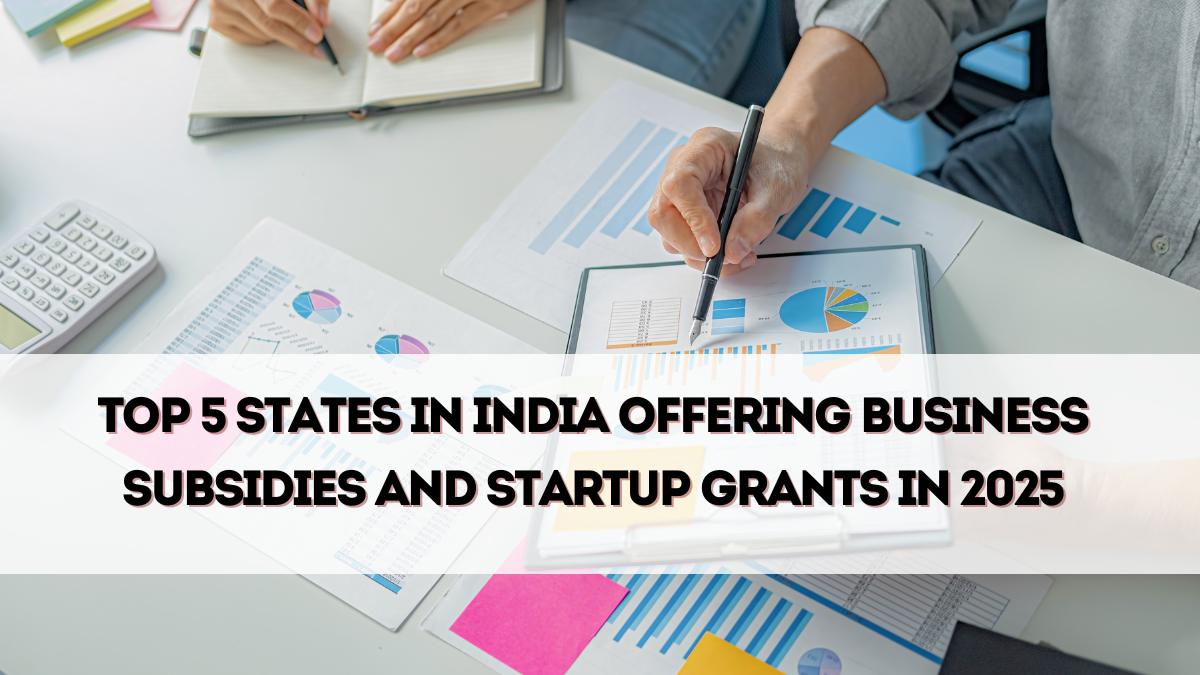For entrepreneurs in India, funding and financial support remain the most crucial challenges when starting a business. While the central government runs initiatives like the Startup India Scheme, many state governments are stepping up with attractive subsidies and grants to encourage local entrepreneurship. In 2025, several states are leading the way in offering startup subsidies by state India 2025, helping small businesses and innovators with seed money, tax exemptions, and infrastructure support.

Why States Are Supporting Startups in 2025
India’s economic growth is increasingly being driven by innovation, and state governments understand the importance of nurturing their local startup ecosystems. By offering subsidies, grants, and incentives, states aim to:
-
Generate local employment opportunities.
-
Promote industrial growth in Tier 2 and Tier 3 cities.
-
Encourage innovation in technology, manufacturing, and services.
-
Attract investors and position themselves as startup-friendly hubs.
This competition among states benefits entrepreneurs by creating a favorable environment for launching and scaling businesses.
Top 5 States Offering Startup Subsidies in 2025
Here are the five states leading the way in startup promotion this year:
1. Karnataka
Known as the “Silicon Valley of India,” Karnataka continues to support startups through its dedicated policies.
-
Key Subsidies: Grants under the Karnataka Startup Policy, support for incubators, and subsidies for R&D activities.
-
Financial Assistance: Startups can receive seed funding of up to ₹50 lakh.
-
Focus Sectors: IT, biotech, agritech, fintech, and clean energy.
-
Why It Stands Out: Bengaluru’s robust ecosystem and access to talent make Karnataka a top choice.
2. Maharashtra
Maharashtra, home to Mumbai and Pune, is another hotspot for entrepreneurs.
-
Key Subsidies: Financial aid for MSMEs, startup seed capital assistance, and tax concessions.
-
Financial Assistance: Subsidies of up to ₹25 lakh for select startups.
-
Focus Sectors: Manufacturing, healthcare, agribusiness, and EV mobility.
-
Why It Stands Out: Strong financial sector presence and industrial infrastructure.
3. Gujarat
Gujarat has consistently supported small businesses with its pro-industry policies.
-
Key Subsidies: Subsidies for electricity, land acquisition, and capital investment under its MSME policy.
-
Financial Assistance: Up to 70% subsidy on R&D and incubation support.
-
Focus Sectors: Textile, renewable energy, pharma, and manufacturing.
-
Why It Stands Out: Vibrant Gujarat summits highlight its pro-business environment.
4. Telangana
Hyderabad’s rise as a tech hub has boosted Telangana’s startup ecosystem.
-
Key Subsidies: Telangana Startup Policy provides subsidies for incubation, patent filing, and technology adoption.
-
Financial Assistance: Seed funding up to ₹10 lakh for early-stage startups.
-
Focus Sectors: IT, AI, blockchain, pharmaceuticals, and agritech.
-
Why It Stands Out: T-Hub, India’s largest startup incubator, supports thousands of entrepreneurs.
5. Tamil Nadu
Tamil Nadu is fast emerging as a strong competitor in supporting small enterprises.
-
Key Subsidies: Capital subsidies for new manufacturing units, tax benefits, and incentives for women entrepreneurs.
-
Financial Assistance: Subsidies of up to ₹25 lakh for innovative startups.
-
Focus Sectors: Automotive, textiles, electronics, and renewable energy.
-
Why It Stands Out: Strong industrial belt and export-oriented infrastructure.
Benefits of State-Level Subsidies
These subsidies provide multiple advantages to entrepreneurs:
-
Reduced Financial Burden: Helps cover initial setup and operational costs.
-
Encouragement of Innovation: Grants encourage experimentation and R&D.
-
Access to Infrastructure: States often provide incubation centers and industrial land.
-
Networking Opportunities: State-supported events connect startups with investors.
-
Inclusivity: Many states prioritize women and rural entrepreneurs.
For startups, these benefits can mean the difference between struggling and scaling successfully.
Challenges in Accessing State Subsidies
While beneficial, subsidies also come with challenges:
-
Lengthy Application Processes: Startups must provide detailed documentation.
-
Limited Awareness: Many entrepreneurs remain unaware of available schemes.
-
Eligibility Restrictions: Subsidies are often sector-specific and limited to registered startups.
-
Delayed Disbursal: Bureaucratic hurdles sometimes delay fund release.
Overcoming these challenges requires proper guidance and planning.
How Startups Can Apply
To avail benefits, startups must:
-
Register under Startup India and state-specific startup policies.
-
Submit business plans and required documents to the state authority.
-
Apply online through dedicated state portals like Karnataka’s Elevate or Telangana’s T-Hub.
-
Track applications and respond promptly to additional queries.
Having a well-prepared proposal increases chances of approval.
The Future of State Startup Subsidies
Looking ahead, state-level startup subsidies will play a critical role in shaping India’s entrepreneurial ecosystem. More states are expected to announce innovative programs focusing on green technology, AI, and rural enterprises. With digital governance, applying for subsidies is becoming faster and more transparent, creating a level playing field for startups in smaller cities.
FAQs
Which state provides the best startup subsidies in India 2025?
Karnataka, Telangana, and Maharashtra are leading in terms of financial support and startup-friendly policies.
Can women entrepreneurs avail extra subsidies?
Yes, many states, including Tamil Nadu and Maharashtra, provide special incentives for women entrepreneurs.
Do startups need to register under Startup India to get state subsidies?
In most cases, yes. Registration under Startup India and the state’s policy framework is required.
What sectors receive the most subsidies in 2025?
Technology, manufacturing, agritech, renewable energy, and healthcare are top sectors for subsidies.
How much funding can startups expect from these state schemes?
Depending on the state and sector, funding may range from ₹10 lakh to ₹50 lakh.
Click here to know more.
